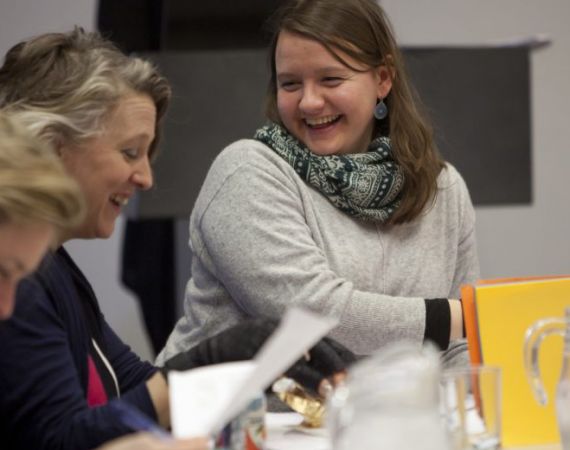Posted on Wed 15 Jun 2016
Unlimited access – my time with Clara
Unlimited works with disabled artists to embed their work within the UK cultural sector, challenge perceptions of disabled people and reach new audiences. Here's some thoughts about my time shadowing Clara...

Clara Giraud and Jo Verrent, image courtesy of Unlimited by Rachel Cherry
I spent two days shadowing Clara Giraud (Unlimited Project Manager) to develop an understanding of the way Unlimited is structured, the complex partnerships they manage and to learn from the inclusive ethos that’s adopted at an organisational and an individual level. Unlimited works with disabled artists to embed their work within the UK cultural sector, challenge perceptions of disabled people and reach new audiences. Unlimited also works internationally and is partnering with Watershed on a creative research residency with 10 UK and Australian disabled artists called Unfixed.
Clara manages relationships with commissioned artists; manages and supports Simon (Unlimited Trainee); works closely with colleagues across Artsadmin and Shape Arts; as well as facilitating relationships with partners and funders. Clara has a clear ability to support and nurture people with a caring and energetic approach. Just from the short time I shadowed her, it was quite clear that Clara embodies the flexible and inclusive approach underlying the core work and ethos of Unlimited.
Here are a few things I have taken away:
1. All meetings should be accessible (to everyone)
Initially, what struck me most about Unlimited was the open and welcoming approach to meetings, which for the most part avoided any jargon or acronyms – I think that’s rare. Meeting the access requirements of everyone in the room was a high priority, ensuring we could all fully participate from observing to chairing.
2. When a + b = quality, who gets to decide what a + b are?
Artistic quality is quite clearly at the very heart of every decision Unlimited make. The team has a nuanced recognition that personal taste and quality do not always align. Unlimited commission artists from all art forms, and work with practitioners, producers and funders in each field to create an environment to raise the ambition and the quality of the work. Jo Verrent (Unlimited Senior Producer) sits on Unlimited’s commission panels but chooses not to vote to ensure her personal taste cannot sway the decision on commissions awarded. I think this is quite a unique approach and one that many arts organisations could benefit from; to diversify their programming, develop relationships with new artists; and ultimately to engage new audiences.
3. International Skype interviews can be challenging - I know this is obvious but I’m going to say it anyway
Observing Skype interviews for Unlimited’s International Placement role was certainly an eye-opener for how important flexibility is when considering individual access requirements. Start with scheduling timeslots in a myriad of time zones, then add in dubious internet connections, English as a second language, cultural differences in interview style and then consider the access requirements of a candidate who has a hearing impairment or is blind. The interview panel freely adapted to the requirements of each candidate and considered their answers within the context of the country they are working within, reflecting on the candidate’s local ecology for disabled artists when assessing their experience and suitability for the role. I am really excited to see who is selected!
4. We should all be Unlimited Allies
I’m proud to work for an organisation that Unlimited calls an ally, and I return to Watershed with a refreshed drive to discuss, question and review accessibility and inclusivity across all of our work. I overheard someone say “wouldn’t it be great in 10 years time if Unlimited didn’t have to exist” – I completely agree. If cultural organisations, programmers, producers, venues, gatekeepers, funders and practitioners all took action to embed the inclusive and creative approach Unlimited champions within their daily processes and structures we could move closer to becoming a more diverse sector and better represent our communities - benefiting the arts sector and our audiences as whole.
Thank you to Clara and the whole Unlimited team for hosting me, and being so generous with their time and expertise.